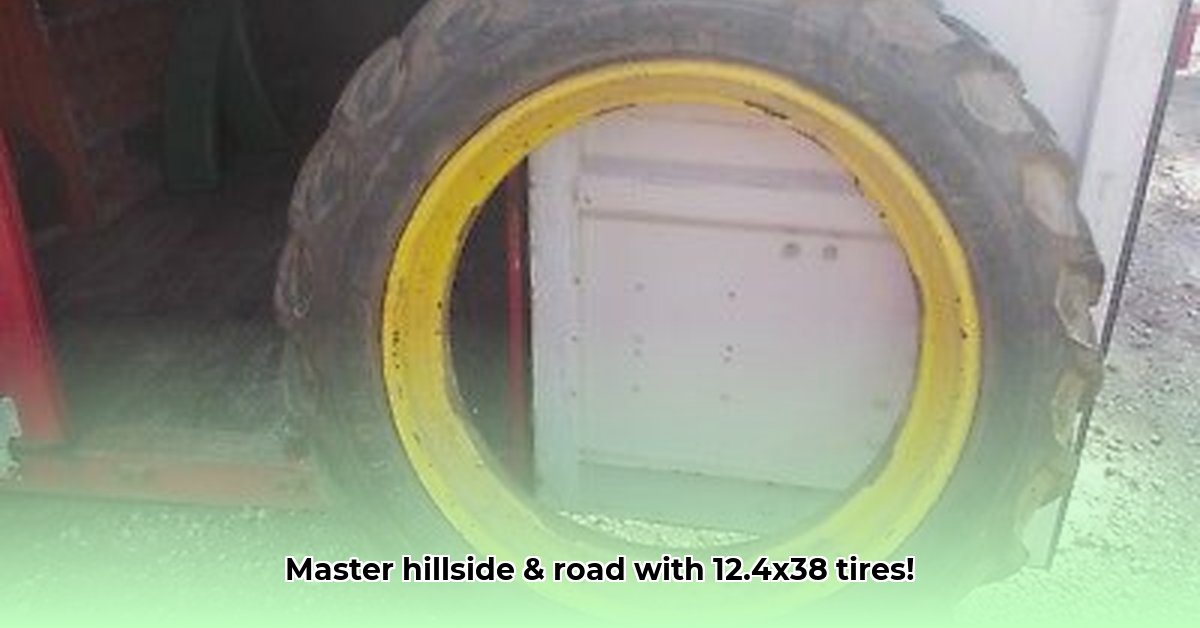
12.4x38 Tractor Tires: Navigating the Hillside and Beyond
Selecting the optimal tractor tires significantly impacts farming efficiency, particularly in challenging hillside environments. This detailed technical review focuses on the Alliance 304, a 12.4x38 tire designed for hillside operations and occasional road use. However, a critical limitation exists: the scarcity of comparative data for 12.4x38 tires hinders a comprehensive evaluation. This analysis will therefore highlight both the strengths of the Alliance 304 and the significant data gaps that prevent definitive conclusions. For optimal tire performance, remember to check tire inflation guidance.
Alliance 304: A Detailed Technical Examination
The Alliance 304 presents several features geared towards hillside performance. Its tread pattern incorporates "knife-like lugs" and a "double angle design," theoretically promoting enhanced traction and self-cleaning capabilities in challenging terrain – think of the aggressive grip of a mountain bike tire adapted for agricultural use. The tire's nylon carcass contributes to mechanical strength and resistance to moisture degradation. This 116 kg tire utilizes an R-1 tread designation, indicating suitability for varied surfaces. However, lacking quantitative data on crucial performance metrics – and comparable competitor data – prevents definitive conclusions on its overall superiority. For instance, while the nylon carcass suggests durability, we lack data on its lifespan or failure rates under typical operating conditions. This lack of information makes it impossible to objectively measure the tire's cost-effectiveness against competitors.
Comparative Analysis: The Data Deficit
A comprehensive comparison of the Alliance 304 against competitors is currently infeasible due to a substantial lack of publicly available data. The following table illustrates the significant information gaps preventing a complete analysis:
| Feature | Alliance 304 | Competitor Data | Notes |
|---|---|---|---|
| Tread Pattern | Aggressive, pointed lugs | Unknown | Subjective observation; quantitative data missing. |
| Carcass Material | Nylon | Varies (Nylon or Steel likely) | Material strength and ply rating need comparison. |
| Weight | 116 kg | Unknown | Weight influences traction and fuel consumption. |
| Intended Use | Hillside, general agriculture | Unknown | Performance differences across diverse applications. |
| Lifespan | Unknown | Unknown | Critical factor determining return on investment. |
| Fuel Efficiency | Unknown | Unknown | Impacts operational costs significantly. |
| Soil Compaction | Unknown | Unknown | Long-term effect on soil health needs assessment. |
| Price | Varies by retailer | Unknown | Price comparison across brands is unavailable. |
This data deficit raises concerns. How can farmers confidently choose the best tire for their needs without complete performance comparisons? The lack of information limits informed decision-making in a crucial aspect of agricultural operations.
Actionable Intelligence: Closing the Knowledge Gap
To address this knowledge gap, multiple stakeholders must take action:
1. Farmers: Conduct on-farm comparisons of various 12.4x38 tires, meticulously documenting fuel consumption, tire wear, traction performance across different soil types, and overall cost. Share these findings to contribute to a growing database of real-world performance data.
2. Manufacturers: Publish comprehensive technical specifications for 12.4x38 tires, including detailed tread designs, carcass construction data, load capacity charts for diverse inflation pressures, and life-cycle testing results. Support the establishment of standardized testing protocols to allow for objective comparison among competing products.
3. Researchers: Develop and implement standardized testing methods for 12.4x38 tires, encompassing traction, durability, fuel efficiency, and soil compaction assessments. Conduct long-term field trials to gather real-world data on tire lifespan and performance under typical agricultural conditions.
Safety and Regulatory Compliance
While the nylon carcass of the Alliance 304 offers inherent strength, tire failure remains a possibility. Regular tire inspections are crucial, coupled with adhering to proper inflation pressures and safe driving practices. Farmers must also comply with all local regulations concerning tire labeling, disposal, and noise emission limits.
Conclusion: A Call for Transparency and Collaboration
This technical review, while focusing on the Alliance 304, underscores a significant challenge: the lack of comparative performance data for 12.4x38 tractor tires. The data gaps highlighted here hamper informed decision-making for farmers and impede progress in agricultural technology. Only through a concerted effort involving farmers, manufacturers, and researchers to generate and openly share comprehensive data about tire performance can we unlock the full potential of these crucial components in agricultural operations.